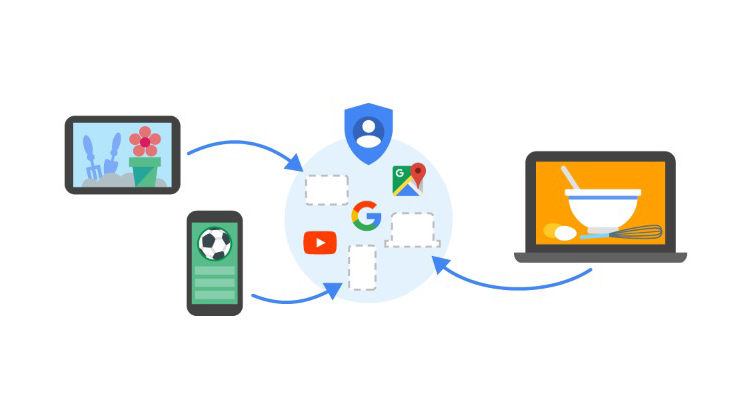
France: Windows 10 collects 'excessive personal data', issues Microsoft with formal warning
After accusations that Windows 10 collects too much data about users, France's National Data Protection Commission (CNIL) has order Microsoft to comply with the French Data Protection Act within three months. The company has been ordered to "stop collecting excessive data and tracking browsing by users without their consent".
In addition to this, the chair of CNIL has notified Microsoft that it needs to take "satisfactory measures to ensure the security and confidentiality of user data". The notice comes after numerous complaints about Windows 10, and a series of investigations by French authorities which revealed a number of failings on Microsoft's part.

Google is receiving more government requests for access to user data than ever before
Transparency reports from the big tech companies always make for interesting reading, and the latest update from Google is no different. Its most recent transparency report covers the period July-August 2015, and shows that the company received a record number of government data requests.
The report shows the number of times governments around the world contacted Google with requests for access to user data. For anyone with an interest in either privacy or security, the marked increase in the number of requests is interesting.
Opera falls into Chinese hands
Key components of Opera Software are to be taken over by a Chinese business consortium. A planned $1.24 billion takeover of the entire operation fell through after failing to gain regulatory approval, but a new deal has been struck in its place.
Instead, the consortium -- comprising Qihoo 360 Technology Co, Beijing Kunlun Tech Co and others -- will take over just a portion of Opera Software's consumer business for $600 million. With the desktop and mobile version of the Opera web browser now falling into Chinese hands, there will no doubt be concerns about potential privacy issues based on China's history.

Privacy alert: Maxthon web browser sends private data about users to China
In the world of web browsers, there are four or five big names to choose from but no end of smaller alternatives. One such browser is Maxthon, and security researchers have just discovered that this Chinese-produced browser is transmitting a wealth of data about users back to China.
Researchers at Fidelis Cybersecurity and Exatel found that Maxthon frequently sends zip files to Beijing over HTTP and this contains a terrifying amount of data about users' browsing habits. The ueipdata.zip file incudes, among other things, details of the sites visited by users, the applications they have installed, and what searches have been performed.

More than half of companies fail to protect privileged credentials
Details of privileged accounts represent a major prize for hackers because they unlock the access required to exploit virtually any part of an organization's network and data. Yet according to a new report many companies are failing to adequately protect them.
The study by privileged account management (PAM) specialist Thycotic and research firm Cybersecurity Ventures benchmarked the PAM performance of more than 550 organizations and found that 52 percent received a failing grade.

Privacy warning: Pokémon Go has full access to your Google account data
Pokémon Go may be proving jaw-droppingly popular, but in the rush to catch 'em all, it seems that users have overlooked something of a privacy issue with the game. It's not unusual for apps and games to request, or require, access to your Google account but there are usually limits in place.
Not so with Pokémon Go. As reported by Search Engine Journal, iOS users have discovered that the game not only requires access to users' Google accounts, it requires full access. This is the highest level of access available to any app and if it is revoked, the game won't work.

Our private data is worth less than we think
Brits think their personal data is really, really valuable. There is nothing wrong with that, and private data should be valued highly, and guarded as such. However, once criminals get a hold of such data, they’ll sell it for such a low price you simply won't believe.
According to a new TotallyMoney.com report, based on a poll of 1,000 consumers, we value an email address at £983. In reality, it is being sold for five pence. A similar thing is with the browsing history. Its actual price on the black market is a ridiculous £0.0014. On average, we value it at £934.

Court papers show Silent Circle's privacy-boosting Blackphone was an unmitigated sales disaster
With so much focus now placed on privacy and security, you would have thought that the Blackphone from Silent Circle would have been a roaring success. But documents from a court case with former partner Geeksphone reveal that there have been just a handful of sales, and revenue is hundreds of millions of dollars lower than expected.
Silent Circle found itself in court after Geeksphone complained that it had not received a $5 million payment agreed as part of a buyout. Geeksphone had helped to build the original Blackphone, and Silent Circle went on to buy the Spanish company's share before launching the Blackphone 2. But sales were much, much lower than expected, leading the company to describe its hardware business to "be a significant financial drain".

Facebook malware infects 10,000 users in two days
A new malware was spotted by security researchers at Kaspersky Lab, targeting Facebook users. According to the researchers’ new report, there have been 10,000 victims in two days.
The malware has two stages: firstly, an unsuspecting victim gets a message from a Facebook friend, saying they had mentioned them in a comment. But when the victim clicks to see the comment, they instead download a bunch of malware, including a Chrome add-on which can take over the victim’s Facebook account, once they log back in.

Identity fraud in UK targets under 30s
New figures reveal a 52 percent rise in young identity fraud victims in the UK. In 2015, just under 24,000 people aged 30 and under were victims of identity fraud. This is up from 15,766 in 2014, and more than double the 11,000 victims in this age bracket in 2010.
The figures from fraud prevention service Cifas -- which is calling for better education about fraud and financial crime -- are released alongside a new short video designed to raise awareness of ID fraud among younger age groups.

Google's creepy My Activity page reveals the terrifying amount of data collected about you
That Google gathers data about you is not news. If you use Google products, it's something you've decided to put up with -- either that, or you live in blissful ignorance of. Whether you're using Gmail and YouTube online, Google keyboard on your Android smartphone, Chrome across platforms, or whatever, being a Google user means handing over an awful lot of personal information.
But just how much does Google know about you? If you use the voice-activated "OK, Google" feature of your phone, there are probably lots of recordings of you stored online; what about everything else? Google has now launched My Activity, a portal which reveals everything the company knows about you. Every search you’ve made, the apps you've used, the videos you've watched, and everything in between.

Ad personalization from Google -- giving power to the people, or a privacy nightmare?
Online ads aren’t going away anytime soon, and that'll keep the likes of Adblock Plus in business for the foreseeable future. But if you choose not to use an ad blocker and are therefore going to be bombarded with ads, they might as well be ads that are relevant to you, right?
Google is rolling out a new feature that enables users to choose the topics they are interested in so the ads they see will be more appropriate to them. But as well as improving the ad experience for users, the new scheme means that advertisers are handed even more information about people that can be exploited for financial gain. It also enables Google to use information it gathers about users to tailor ads.

EU-US Privacy Shield: White House promises not to spy on European data
The replacement for data protection arrangement Safe Harbour, the EU-US Privacy Shield, has undergone final amendments. Safe Harbour has already been deemed invalid, and frantic talks have been underway to finalize its successor.
Despite gaining the backing of Microsoft, EU-US Privacy Shield has faced a great deal of criticism. In the wake of the Brexit vote in the UK referendum on EU membership, the UK may be forced to comply with the rules even though it is in the process of exiting the Union. One of the most significant changes to come about -- and one that will be welcomed by privacy advocates -- is a promise from the White House not to engage in indiscriminate bulk data collection of European data.

Apple is leaving the iOS 10 kernel unencrypted... to increase security
Each new version of iOS is eagerly awaited, and at its Worldwide Developer Conference (WWDC) Apple unveiled a preview of iOS 10. Much has been made of the new features, but developers probing the operating system are making a surprising discovery. The kernel of iOS 10 is unencrypted.
In the current climate of security-awareness, this might seem like something of an unusual decision. But Apple says that the change has been made to improve performance, and it could even help to increase security.

How mobile device management could be invading your privacy
Many companies now turn to mobile device management (MDM) to control and monitor their employees' mobile use. But a new study from data protection company Bitglass reveals that MDM itself represents a threat to privacy.
Bitglass researchers configured MDM software to route mobile data traffic through a corporate proxy and installed corporate-issued certificates on employee devices to decrypt SSL traffic. This, a common configuration in enterprise MDM deployments for inspecting traffic for malware, enabled researchers to see the contents of employees' personal email inboxes, social networking accounts and even banking information.
